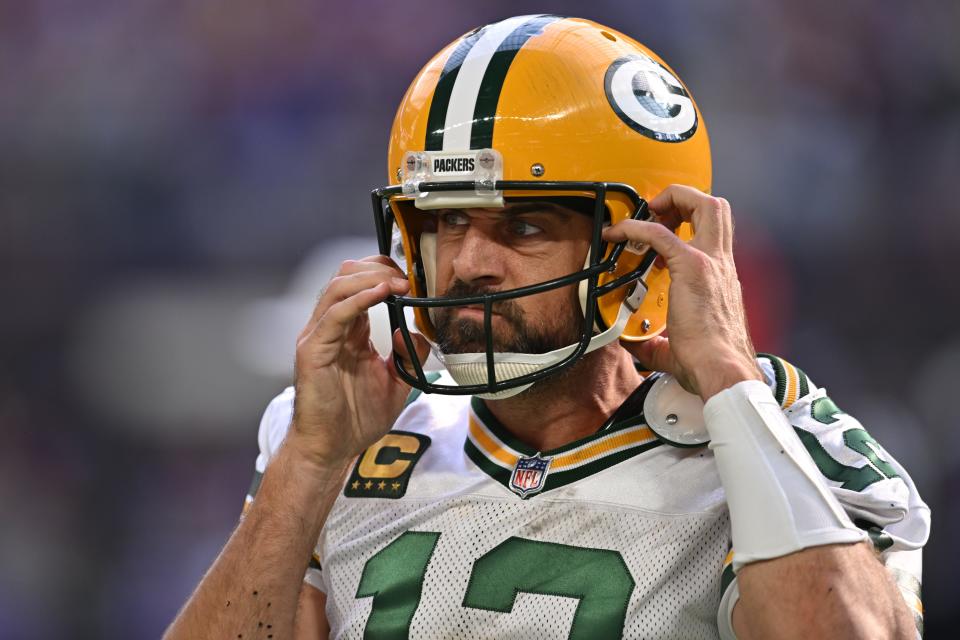No, Aaron Rodgers wasn't the Packers' GOAT. Here's why that's part of QB's legacy.
No, Aaron Rodgers wasn’t Green Bay’s GOAT.
Sure, his credentials might stack up. The man was named the NFL’s Most Valuable Player four times, more than anybody except five-time winner Peyton Manning. During his 18 seasons with the Green Bay Packers, A-Rod passed for more than 59,000 yards and threw for 475 touchdowns.
He owned the Chicago Bears, too.
Yet in the championship department, Rodgers, 39, was such an underachiever.
For all those MVP awards, Rodgers led the Packers to one Vince Lombardi Trophy.
Just one.
The completion of the trade Monday that sent Rodgers to the New York Jets (finally) renews the debate. Bart Starr (two Super Bowl victories, five NFL championships), field general of Lombardi’s dynasty teams in the 1960s, still gets the nod over Brett Favre in my book as the greatest player in Packers history, even though Starr played in the era before the passing game took over.
Yes, you can call Rodgers the greatest passer in Packers history, especially when considering how reckless the gunslinging Favre was. But Rodgers’ legacy also includes the reality that while often hailed as the NFL’s most talented quarterback, he never gave Tom Brady a run for his money in collecting Super Bowl rings.
Rodgers knows. Or maybe not. There’s a lot of gray area in the Green Bay GOAT department.
“I would say this is debatable, but I’m debatably the best player in franchise history,” Rodgers said during his lengthy interview on "The Pat McAfee Show" in mid-March. “I’m in the conversation for sure.”
As he put it, debatably.
NFL MOCK DRAFT: Aaron Rodgers trade shakes up first-round outlook

It counts for something that Rodgers put in some serious time in Green Bay, even though his final few offseasons were so dramatic as he contemplated retirement and relations were strained with the front office – especially after he was kept in the dark (without a retreat) about the selection of successor Jordan Love with a first-round pick in 2020.
Eighteen years.
“You can’t debate that anybody has been there longer than I have,” Rodgers continued with McAfee. “And nobody has bled green and gold like me.”
Of course, that final point might be debated by any given Packer whose career ended with a busted knee or whose quality of life worsened after absorbing a series of concussions. But we get his point. And saw it, too. Rodgers left it on the field, never leaving any doubt that he wasn’t all in…except when it came to COVID-19 vaccinations.
Still, the Super Bowl number was one.
Rodgers took the Cheeseheads to the mountaintop in Super Bowl 45 to cap an incredible 2010 season that included winning three consecutive road playoff games in emerging as the NFC’s sixth seed.
But it never happened again. Green Bay posted an NFL-best 15-1 record in the season following the Super Bowl triumph, but Rodgers played poorly (two turnovers, 78.5 passer rating, four sacks) in the Packers' upset defeat at Lambeau Field at the hands of the New York Giants in the NFC divisional playoffs.
More recently, Green Bay earned the No. 1 seed in the NFC playoffs in 2020 and 2021 – and was similarly unable to parlay home-field advantage into a Super Bowl berth.
No, it’s never all on the quarterback. But the Packers fielded decent defenses and surrounded Rodgers with targets, backs and formidable O-lines, and the quarterback didn’t raise his game when his team needed it most.
In the five-point loss to Brady and the Tampa Bay Buccaneers in the NFC title game in January 2021, the Pack went three-and-out on two consecutive drives in crunch time – when Rodgers threw six consecutive passes. The next year, in falling to the San Francisco 49ers in the divisional round, Rodgers and his offense could generate just 10 points on a frigid and snowy night. The 49ers scored 13.
As much as Rodgers could drop your jaw by rolling right and launching left for a 50-yard dime, those recent playoff clunkers and inability to spark his team to greater heights while holding the No. 1 seed certainly undermined his Packers legacy.
Quarterbacks like Rodgers deserve to get a lot of credit (and many of the commercials) when things are rolling, but by the same token, they are positioned to take the hits, too.
There are many franchises – including the Jets – that would trade their historical futility on any day for the can’t-get-over-the-hump experiences that Rodgers endured.
He led the Packers to eight NFC North titles in 15 seasons as a starter. What’s wrong with that? It’s a mark of excellence that some NFL teams have never, ever seen in their histories. He produced Hall of Fame credentials and so many highlights. If there’s time for one play, one throw, there’s no one you’d rather have to heave that make-or-break Hail Mary pass.
It’s just that for all of his greatness, the playoff setbacks leave his Packers legacy as half-empty as Rodgers reunites with Jets coordinator and coaching pal Nathaniel Hackett. Maybe it adds to the competitive fire that can be stoked with the Jets.
No, Rodgers didn’t leave as Green Bay’s GOAT. But it was a good run.
And fitting, too, that for good measure it finally ended with one more long dose of drama.
Follow USA TODAY Sports' Jarrett Bell on Twitter @JarrettBell.
This article originally appeared on USA TODAY: Aaron Rodgers' Packers legacy: QB wasn't the GOAT in Green Bay
